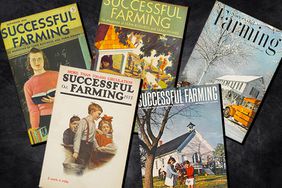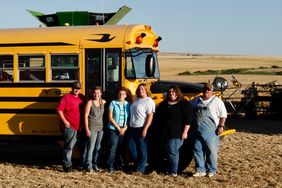:max_bytes(150000):strip_icc()/PSX_20200401_104444-2-88dd5dc14e1b4c7e8975bd03e7e5d905.jpg)
There's a lot of talk about "summer brain drain" in kids when they have no classes for almost three months over summer break. This year, kids are facing an even more extended period away from school because of coronavirus. Some may have online activities assigned by teachers, but others do not, especially rural schools where broadband internet access isn't available to all students.
"While some children are able to maintain school learning during the summer, others can take weeks or even months to recover from summer learning loss when they go back to school in the fall," says Iowa State University Extension family life specialist Donna Donald. This year will likely take even longer. Math, language, and spelling skills are most affected, Donald says.
Here are some fun ways to keep kids mentally sharp during this time away from school.
Keep reading
Most public libraries offer e-books and audiobooks, and many are holding online reading programs for kids and book clubs for grown-ups right now. Other libraries are letting patrons call in orders and pick books up at the curb once a week.
Start a reading log where everyone in the family can track books they're reading. Pick a book and read together as a family. I recommend the Little House series by Laura Ingalls Wilder. In addition to just being great books, they offer reminders to kids about how easy our lives really are today, even with inconveniences we're dealing with because of coronavirus. Remember how excited Laura was to get her own cup so she didn't have to share with Mary anymore? That kind of gratitude is a good lesson for kids and adults alike.
Several celebrities are reading stories online for young kids who are at home during the coronavirus pandemic. Dolly Parton is reading bedtime stories to kids once a week on her YouTube channel, and past sessions are also available. Storyline Online, a children's literacy website from the Screen Actors Guild and American Federation of Television and Radio Artists Foundation, features dozens of videos of celebrities like Betty White, Kevin Costner, Melissa Gilbert, James Earl Jones, and many others reading children's books.
The celebrities kids might want to hear from most are their grandparents, though, especially if they can't visit because of social distancing. Set up a video conference or phone call so grandparents can read a favorite story or listen to their grandkids read.
Ag activities
A group of ag teachers from throughout Iowa has compiled a list of online resources and educational activities related to agriculture. Alex Rogers, the agriculture instructor and FFA advisor for Southeast Warren Schools in Liberty Center, Iowa, shared the list with his students. "In my opinion, the best way for a student to learn is by being hands-on," he says.
- Read the list: Ag students can learn online
Math practice adds up
Let kids help you compare grocery prices, calculate gas mileage, or follow a recipe. Ask them to find the average number of eggs collected per chicken each week, or the amount of water each cow drinks every day. Play a board game that requires counting money. These types of tasks will encourage kids to use their math skills without even realizing it.
Science in action
Talk to your kids about how science is important on the farm, whether it's figuring out the nutritional needs of livestock or making decisions about applying chemicals. Let them help plant the garden, or give each child an individual garden plot to grow their favorite foods.
- Read more: 9 kids' garden projects
Get creative
Ask kids to write a story about something that interests them or journal about their experience during this unusual time. They can work together to turn their idea into a movie. Host a family premiere night with popcorn. Keep craft supplies handy and encourage kids to create works of art. Take a virtual tour of an art museum. Keep practicing those instruments that came home on the last day of school. Remember that the arts are a source of comfort for people in times of stress.
Teach life skills
Not all important lessons are learned in the classroom. Take advantage of kids' extra time at home (especially high schoolers) and teach them things they'll need to know in the real world, like how to check the fuse box and change a fuse, balance a checkbook and create a budget, do laundry, and create a meal with only what's available in the pantry and freezer. You might also consider letting them sit in on farm business meetings. Let them hear your conversation about planting decisions and share their thoughts.
Stay active
For most farm kids, getting in the recommended one hour of physical activity each day isn't a problem. If you have a child who needs help in this department, Donald suggests, "Walk, run, and play with your child. Make physical activity fun. Encourage them to try different activities and games. Let them help plan family activities." Make the most out of things that need to be done like taking the whole family along to walk fence. Remind your kids (and yourself) how lucky you are to have such a big space to move around in without compromising social distancing guidelines, when those in cities are not so fortunate. Talk about the things you see around the farm, share stories from your own childhood, and enjoy the fresh air together.
- Read more: Resolve to 'agcercise'
:max_bytes(150000):strip_icc()/LisaFoustPrater-5d5284849acc417c8678324f9c660161.jpg)






